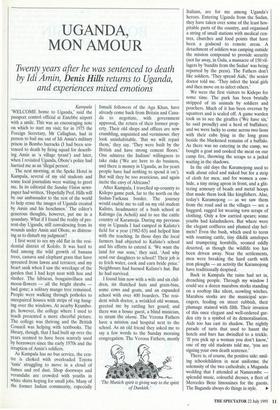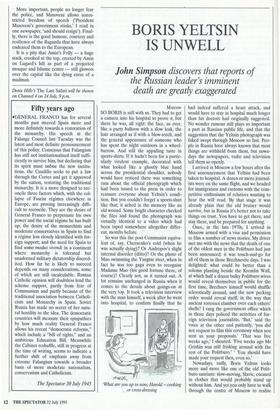UGANDA, MON AMOUR
Twenty years after he was sentenced to death
by Idi Amin, Denis Hills returns to Uganda,
and experiences mixed emotions
Kampala 'WELCOME home to Uganda,' said the passport control official at Entebbe airport with a smile. This was an encouraging note on which to start my visit; for in 1975 the Foreign Secretary, Mr Callaghan, had in person to bail me out of Idi Amin's military prison in Bombo barracks (I had been sen- tenced to death by firing squad for describ- ing Amin as 'a village tyrant') and later, when I revisited Uganda, Obote's police had harried me as an 'illegal person'.
The next morning, at the Speke Hotel in Kampala, several of my old students and some local journalists were waiting to greet me. In its editorial the Sunday Vision news- paper had written, 'Hopefully Prof. Hills will be our ambassador to the rest of the world to help erase the images of Uganda created by Amin and his henchmen.' The editor's generous thoughts, however, put me in a quandary. What if I found the reality of pre- sent-day Uganda, still convalescing from its wounds under Amin and Obote, so distress- ing as to disturb my judgment?
I first went to see my old flat in the resi- dential district of Kololo. It was hard to find among the wild growth of banana trees, cassava and elephant grass that have sprouted from lawns and terraces; and my heart sank when I saw the wreckage of the garden that I had kept neat with hoe and slasher. The hibiscus, bougainvillaea and moon-flowers — all the bright shrubs — had gone; a solitary mango tree remained. People were walking through potholes to unrepaired houses with strips of rag hang- ing over the windows. At nearby Kyambo- go, however, the college where I used to teach presented a more cheerful picture. The college was thriving and the British Council was helping with textbooks. The library, though, that I had built up over the years seemed to have been scarcely used by borrowers since the early 1970s and the irruption of Amin's soldiers.
As Kampala has no bus service, the cen- tre is choked with overloaded Toyota 'taxis' struggling to move in a cloud of fumes and red dust. Shop doorways and verandahs are crowded with youths in white shirts hoping for small jobs. Many of the former Indian community, especially Ismaili followers of the Aga Khan, have already come back from Britain and Cana- da to negotiate, with government approval, the return of their former prop- erty. Their old shops and offices are now crumbling, unpainted and verminous: they look uninhabitable. 'But we will repair them,' they say. 'They were built by the British and have strong cement floors.' One admires the Indians' willingness to take risks ('We are here to do business, and there is money in Uganda, as for year§ people have had nothing to spend it on'). But will they be too avaricious, and again incite the envy of Africans?
After Kampala, I travelled up-country to Kidepo game park, far to the north on the Sudan-Turkana border. The journey would enable me to call on my old student Kalisto, headmaster of a bush school at ICalongo (in Acholi) and to see the cattle country of Karamoja. During my previous stay in Uganda I had camped in Kalisto's field for a year (1982-83) and helped him with the teaching. In those days the local farmers had objected to Kalisto's school and his efforts to extend it. 'We want the land for our sons,' they said. 'And why send our daughters to school? Their job is to fetch water, cook and earn bride price.' Neighbours had burned Kalisto's hut. But he had survived.
I found him now with a wife and six chil- dren, six thatched huts and grain-bins, some cows and goats, and an expanded school with over 400 boarders. The resi- dent witch doctor, a wrinlded old woman, greeted me by rattling her gourd; and there was a house guest, a blind musician, to strum the olcemi. The Verona Fathers have a mission and hospital next to the school. As an old friend they asked me to say a few words to the Sunday morning congregation. The Verona Fathers, mostly 'The Munich spirit is giving way to the spirit of Dunkirk' Italians, are for me among Uganda's heroes. Entering Uganda from the Sudan, they have taken over some of the least hos- pitable parts of the country, and organised a string of small stations with medical cen- tres, churches and food points that have been a godsend to remote areas. A detachment of soldiers was camping outside the mission compound to provide security (not far away, in Gulu, a massacre of 150 vil- lagers by 'bandits from the Sudan' was being reported by the press). The Fathers don't like soldiers. 'They spread Aids,' the senior doctor told me. 'They infect the local girls and then move on to infect others.'
We were the first visitors to Kidepo for some time. The park has been brutally stripped of its animals by soldiers and poachers. Much of it has been overrun by squatters and is sealed off. A game warden took us to see the giraffes ('We have six,' he said proudly) and a herd of buffaloes; and we were lucky to come across two lions with their cubs lying in the long grass beside the blackened remains of a buffalo. As there was no catering in the camp, we bought a goat and cooked the meat on our camp fire, throwing the scraps to a jackal waiting in the shadows.
In the old days the Karamojong used to walk about oiled and naked but for a strip of cloth for men, and for women a cow- hide, a tiny string apron in front, and a glit- tering armoury of beads and metal hoops that made them look like kingfishers. Alas, today's Karamojong — as we saw them from the road and in the villages — are a haggard, ragged lot wearing torn scraps of clothing. Only a few carried spears; some youths had kalashnikovs. But where were the elegant coiffures and plumed clay hel- mets? Even the bush, which used to teem with roaming cattle, tiny dikdik antelopes and trumpeting hornbills, seemed oddly deserted, as though the wildlife too has been driven away. Near the settlements, men were breaking the hard earth with iron ploughs — an activity the Karamojong have traditionally despised.
Back in Kampala the rains had set in, drenching people. Through my window I could see a dozen marabou storks standing on a rooftop like silent, scowling witches. Marabou storks are the municipal scav- engers, feeding on street rubbish, their plumage stained with filth. Their invasion of this once elegant and well-ordered gar- den city is a symbol of its demoralisation. Aids too has cast its shadow. The nightly parade of tarts that used to haunt the hotels and bars has dwindled to a trickle. 'If you pick up a woman you don't know,' one of my old students told me, 'you are signing your own death sentence.'
There is, of course, the positive side: smil- ing schoolchildren in neat uniforms; the solemnity of the two cathedrals; a Muganda wedding that I attended at Namirembe — splendid music, colourful dresses, a fleet of Mercedes Benz limousines for the guests.
The Baganda always do things in style. ■ More important, people no longer fear the police, and Musoveni allows unres- tricted freedom of speech (President Musoveni's government stinks,' I read in one newspaper, 'and should resign'). Final- ly, there is the good humour, courtesy and resilience of the Baganda that have always endeared them to the European.
It is a pity that Amin's Folly — a huge stack, crooked at the top, erected by Amin on Lugard's hill as part of a projected mosque and Islamic centre — still glowers over the capital like the dying curse of a madman.
Denis Hills's The Last Safari will be shown on Channel 4 on 24 July, 9 p.m.



















































 Previous page
Previous page